News
Ghana becomes record fifth African nation to take over from ruling party this year

Ghana’s vote brings to an end a remarkable 12 months in African politics, which have seen five transfers of power – more than ever before. This “annus horribilis” for governments has now also brought opposition victories in Botswana, Mauritius, Senegal and the self-declared republic of Somaliland.
Even beyond these results, almost every election held in the region this year under reasonably democratic conditions, has seen the governing party lose a significant number of seats.
This trend has been driven by a combination of factors:
*the economic downturn
*growing public intolerance of corruption
*and the emergence of increasingly assertive and well-co-ordinated opposition parties.
The trend is likely to continue into 2025, and will cause trouble for leaders such as Malawian President Lazarus Chakwera, whose country goes to the polls in September.
One of the most striking aspect of the elections that have taken place in 2024 is that many have resulted in landslide defeats for governments that have previously appeared to have a strong grip on power – including in countries that have never before experienced a change at the top.
The Botswana Democratic Party (BDP) that had ruled the country since independence in 1966 was crushed in October’s general elections.
As well as losing power, the BDP went from holding 38 seats in the 69-strong parliament to almost being wiped out.
After winning only four seats, the BDP is now one of the smallest parties in parliament, and faces an uphill battle to remain politically relevant.
There was also a landslide defeat for the governing party in Mauritius in November, where the Alliance Lepep coalition, headed by Pravind Jagnauth of the Militant Socialist Movement, won only 27% of the vote and was reduced to just two seats in parliament.
With its rival Alliance du Changement sweeping 60 of the 66 seats available, Mauritius has experienced one of the most complete political transformations imaginable.
Senegal and the self-declared republic of Somaliland also saw opposition victories.
In the case of Senegal, the political turnaround was just as striking as in Botswana, albeit in a different way.
Just weeks ahead of the election, the main opposition leaders Bassirou Diomaye Faye and Ousmane Sonko were languishing in jail as the government of President Macky Sall abused its power in a desperate bid to avert defeat.
After growing domestic and international pressure led to Faye and Sonko being released, Faye went on to win the presidency in the first round of voting, with the government’s candidate winning only 36% of the vote.
Even in cases where governments have not lost, their reputation and political control have been severely dented.
South Africa’s African National Congress (ANC) retained power but only after a bruising campaign that saw it fall below 50% of the vote in a national election for the first time since the end of white-minority rule in 1994.
This forced President Cyril Ramaphosa to enter into a coalition government, giving up 12 cabinet posts to other parties, including powerful positions such as home affairs.
The recent elections in Namibia told a similar story. Although the ruling party retained power, the opposition has rejected the results and claims the poll was badly manipulated after it was marred by logistical problems and irregularities.
Even with the flaws, the government suffered in the parliamentary election, recording its worst-ever performance, losing 12 of its 63 seats and only just holding on to its parliamentary majority.
As a result, a region that is known more for governments that manage to hold on to power for decades has seen 12 months of vibrant, intensely contested, multiparty politics.
The only exceptions to this have been countries where elections were seen as neither free nor fair, such as Chad and Rwanda, or in which governments were accused by opposition and rights groups of resorting to a combination of rigging and repression to avert defeat, as in Mozambique.
Three trends have combined to make it a particularly difficult year to be in power.
In Botswana, Mauritius and Senegal, growing citizen concern about corruption and the abuse of power eroded government credibility.
Opposition leaders were then able to play on popular anger at nepotism, economic mismanagement and the failure of leaders to uphold the rule of law to expand their support base.
Especially in Mauritius and Senegal, the party in power also undermined its claim to be a government committed to respecting political rights and civil liberties – a dangerous misstep in countries where the vast majority of citizens are committed to democracy, and which have previously seen opposition victories.
The perception that governments were mishandling the economy was particularly important because many people experienced a tough year financially.
High food and fuel prices have increased the cost of living for millions of citizens, increasing their frustration with the status quo.
In addition to underpinning some of the government defeats this year, economic anThis is not an African phenomenon, of course, but a global one.
Popular discontent over inflation played a role in the defeat of Rishi Sunak and the Conservative Party in the UK and the victory of Donald Trump and the Republican Party in the United States.
What was perhaps more distinctive about the transfers of power in Africa this year was the way that opposition parties learned from the past.
In some cases, such as Mauritius, this meant developing new ways to try and protect the vote by ensuring every stage of the electoral process was carefully watched.
In others, it meant forging new coalitions to present the electorate with a united front.
In Botswana, for example, three opposition parties and a number of independent candidates came together under the banner of the Umbrella for Democratic Change to comprehensively out-mobilise the BDP.
A similar set of trends is likely to make life particularly difficult for leaders that have to go to the polls next year, such as Malawi’s President Chakwera, who is also struggling to overcome rising public anger at the state of the economy.
With the defeat of the NPP in Ghana, Africa has seen five transfers of power in 12 months. The previous record was four opposition victories, which occurred some time ago in 2000.
That so many governments are being given an electoral bloody nose against a backdrop of global democratic decline that has seen a rise in authoritarianism in some regions is particularly striking.
It suggests that Africa has much higher levels of democratic resilience than is often recognised, notwithstanding the number of entrenched authoritarian regimes that continue to exist.
Civil society groups, opposition parties and citizens themselves have mobilised in large numbers to demand accountability, and punish governments that have failed both economically and democratically.
International governments, organisations, and activists looking for new ways to defend democracy around the world should pay more attention to a region that is often assumed to be an inhospitable environment for multiparty politics, yet has seen more examples of democratic bounce-back than other regions of the world.
BBC
News
“How we imortalised Olunloyo before his death-Makinde
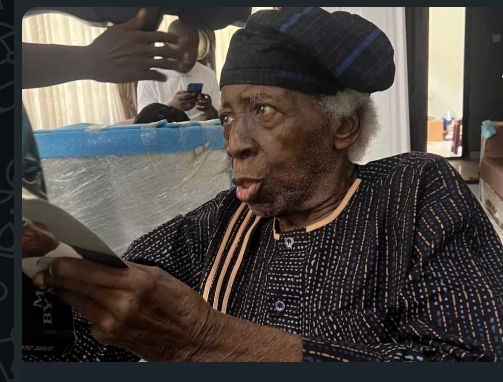
By Kayode Sanni-Arewa
Governor of Oyo State, Seyi Makinde has said he is happy that former governor of the State, Omololu Olunloyo was imortalised before his demise.
Makinde, in a condolence message by his media aide Sulaimon Olanrewaju on Sunday, said the country had lost a patriotic leader, an icon and one of its most cerebral former administrators with the politician’s demise.
The governor said it is sad that the late mathematical guru and administrator passed away before his 90th birthday.
“This death hits differently because I was looking forward to Baba’s 90th birthday, which would have come up on April 14. However, we have to submit to the will of God, who gives and takes lives as He wills.
“My joy is that our government immortalised and honoured Pa Olunloyo in his lifetime and he was present to witness it as we named the Ibadan Airport Road and the Leisure Park on the axis after him in recognition of his service to the state.
“May the Lord grant repose to his soul and give his family the fortitude to bear his demise,” Mr Makinde said.
The death of Mr Olunloyo was confirmed on Sunday morning through a statement by his family.
The deceased died just a few days before his 90th birthday, according to the statement.
News
Iran turns down Trump’s call for direct nuclear talks

Iran’s top diplomat has rejected direct negotiations with the United States as pointless, his office said Sunday, after US President Donald Trump said he preferred face-to-face talks over its nuclear programme.
Trump sent a letter to Iran’s supreme leader Ayatollah Ali Khamenei last month calling for negotiations but warning of military action if diplomacy failed.
On Thursday, the US president said he favoured “direct talks”, arguing they were “faster” and offered a better understanding than going through intermediaries.
But Iranian Foreign Minister Abbas Araghchi said direct talks made no sense with a country “that constantly threatens to resort to force in violation of the UN Charter and that expresses contradictory positions from its various officials”.
“We remain committed to diplomacy and are ready to try the path of indirect negotiations,” he was quoted as saying in a statement issued by his ministry.
Iran keeps itself prepared for all possible or probable events, and just as it is serious in diplomacy and negotiations, it will also be decisive and serious in defending its national interests and sovereignty.”
On Saturday, Iranian President Masoud Pezeshkian said his country was willing to engage in dialogue with the United States on an “equal footing”.
He also questioned Washington’s sincerity in calling for negotiations, saying “if you want negotiations, then what is the point of threatening?”
Iran and the United States have had no diplomatic relations since shortly after the 1979 Islamic Revolution with some regional countries like Oman playing a mediating role between the two sides.
Letter diplomacy
Trump’s letter was delivered to Iran via the United Arab Emirates, and Tehran responded at the end of March via the Sultanate of Oman.
On Sunday, the chief of staff of the Iranian armed forces, General Mohammad Bagheri, said Iran’s response stressed that “we seek peace in the region”.
“We are not the ones who start wars, but we will respond to any threat with all our might,” he said of the content of Iran’s response.
Western countries, led by the United States, have for decades accused Tehran of seeking to acquire nuclear weapons.
Iran rejects the allegation and maintains that its nuclear activities exist solely for civilian purposes.
In 2015, Iran reached a landmark deal with the permanent members of the UN Security Council, namely the United States, France, China, Russia, and the United Kingdom, as well as Germany, to limit its nuclear activities.
The 2015 agreement — known as the Joint Comprehensive Plan of Action — gave Iran sanctions relief in exchange for curbs on its nuclear programme to guarantee that Tehran could not develop a nuclear weapon.
In 2018, during Trump’s first term in office, the United States withdrew from the agreement and reinstated biting sanctions on Iran.
A year later, Iran began rolling back on its commitments under the agreement and accelerated its nuclear programme.
On Monday, Ali Larijani, a close adviser to Khamenei, warned that while Iran was not seeking nuclear weapons, it would “have no choice but to do so” in the event of an attack against it.
News
Nigerian Army ‘Destr0ys Over 70 Bandits Dens In Taraba, Wastes Three Terrorists’
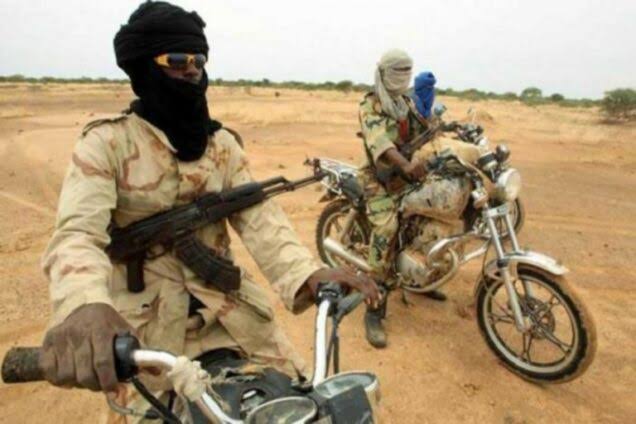
During the operation, three terrorists were reportedly eliminated, and security forces recovered firearms and logistical supplies.
The Nigerian Army says it has destroyed over 70 camps used by bandits in Taraba State, as part of a continued effort to combat terrorism in the region.
During the operation, three terrorists were reportedly eliminated, and security forces recovered firearms and logistical supplies.
SaharaReporters learnt that the military engaged the terrorists at a hideout in Achelle, situated within the Karim Lamido Local Government Area, as part of their ongoing efforts to dismantle the remaining elements of terrorist groups in the state.
Captain Oni Olubodunde, spokesperson for the 6 Brigade of the Nigerian Army in Jalingo, confirmed the operation, stating that its primary objective was to identify and neutralise dangerous criminals active in the area.
Olubodunde further reported that, in addition to eliminating the three terrorists, security personnel seized an AK-47 rifle, ammunition, and two motorcycles during the operation, which took place on April 5, 2025.
“In continuation of Operation Lafiya Jama’a, a military offensive to remove criminal elements from Taraba State, the brave troops of the 6 Brigade Nigerian Army and Sector 3 Operation Whirl Stroke (OPWS) successfully neutralised three bandits, destroyed several camps, and seized weapons and ammunition during a daring clearance operation conducted in the Karim Lamido Local Government Area on April 5, 2025,” said Olubodunde.
The operation targeted suspected bandit hideouts, beginning in Achelle, where troops carried out a thorough sweep before advancing to Chibi.
As forces reportedly approached Chibi, the bandits attempted to escape but were intercepted. In the ensuing clash, three bandits were eliminated, and multiple makeshift camps were destroyed. Security personnel also seized two motorcycles, an AK-47 magazine, and 13 rounds of 7.62mm special ammunition.
Furthermore, troops conducted extensive searches in the Dutsen Zaki and Achalle areas, where over 70 criminal camps have been dismantled in recent weeks.
According to Olubodunde, no signs of human activity were detected during this latest operation, underscoring the effectiveness of previous security efforts.
Brigadier General Kingsley Chidiebere Uwa, Commander of the 6 Brigade Nigerian Army, praised the troops for their dedication and strategic execution. He reassured the people of Taraba State that terrorists and criminals would find no refuge in the region.
General Uwa also urged residents to remain vigilant while going about their daily activities without fear. He emphasised the importance of maintaining law and order.
He encouraged the public to provide timely and credible information to security agencies, stressing that such cooperation is essential for ensuring the safety of local communities.
-
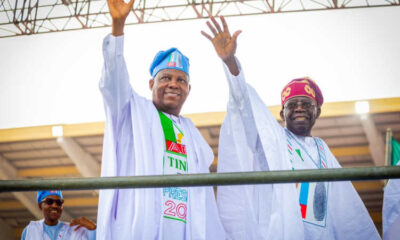
 Politics9 hours ago
Politics9 hours agoTinubu Gives Fani Kayode, Others New Appointments (See Full List)
-

 News9 hours ago
News9 hours agoDANGER! Ex-Soldier Abubakar Affan Vows to Kill VeryDarkMan ‘Like Deborah Samuel’
-

 News12 hours ago
News12 hours agoWhy NYSC maybe extended by FG- Minister
-
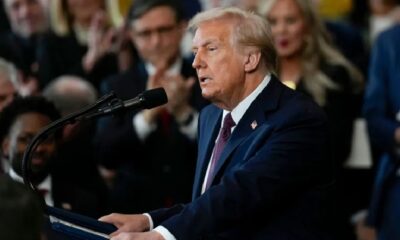
 News22 hours ago
News22 hours agoVOA Halts Operations In Nigeria, Others Over President Trump
-

 News12 hours ago
News12 hours agoIbas moves to rehabilitate damaged Rivers LG secretariats
-
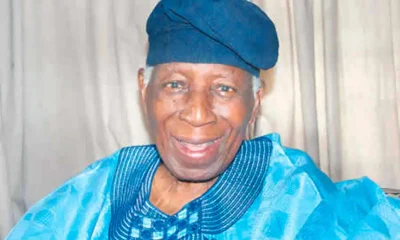
 News9 hours ago
News9 hours agoJust in: Ex-Oyo governor, Olunloyo is dead
-

 Economy12 hours ago
Economy12 hours agoCBN allocates $197.71m into FX market to support naira
-

 News23 hours ago
News23 hours agoPolice rescue 14 kidnapped passengers of Benue Links


















